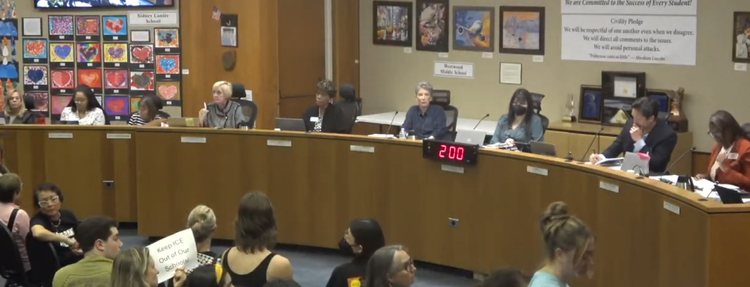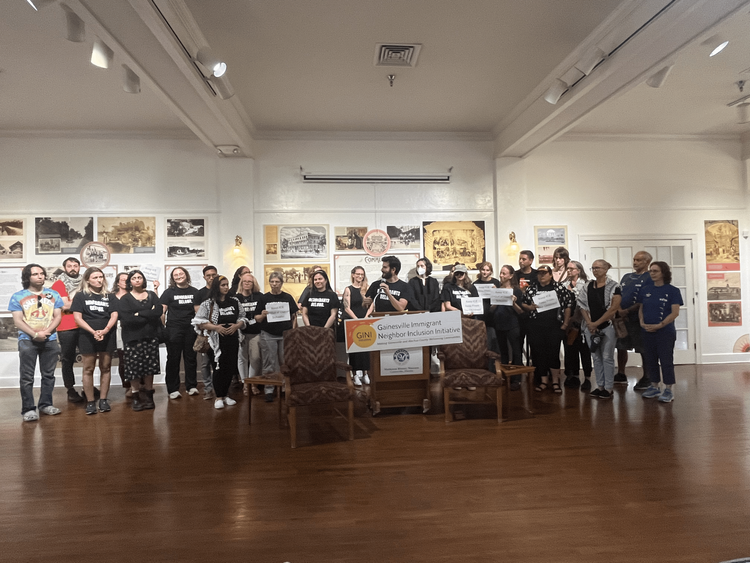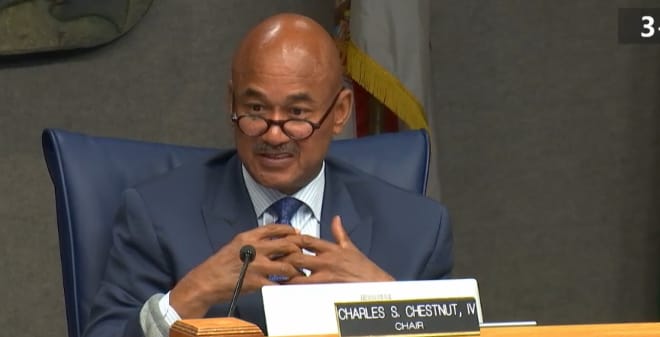GRU Authority Conducts Controversy Over Potential GSC Elimination and Search for New General Manager

The Gainesville Regional Utilities (GRU) Authority held a meeting yesterday evening to listen to a presentation from GRU staff about GRU’s debt portfolio and decide the process to be used in hiring a new general manager. Gainesville Residents United handed out litigation forms at the entrance, detailing the various lawsuits against the authority and their argument for why it is unconstitutional.
Scott Walker joined the board members at the table for the first time, with General Manager Tony Cunningham announcing the contract between the board and Walker was negotiated, and he now serves as interim attorney for the authority.
To begin the meeting, Chair Craig Carter said he wanted to do what he called “rumor control” and stated that the University of Florida (UF) was one of GRU’s largest customers, spending 36 million dollars a year on electricity. UF’s official website disputes this, stating they get their electricity from Duke Energy.
Carter clarified that the general funds transfer was not on the agenda, as he had the notion that many were in attendance to discuss possible budget cuts. Carter said he understood their passion for local organizations but stood in that it was not something for the authority to take into consideration and that it should be run like a business.
During the time for citizen comment on non-agenda items, some attendees criticized the authority for their discussions of eliminating the government services contribution (GSC), while others argued the elimination of the GSC was necessary.
The President of the League of Women Voters of Alachua County, Janis Garry, voiced the potential negative impacts for Gainesville residents if the GSC is cut or eliminated.
“If you live in Gainesville and your home has a fire, you want to have trained fire rescue professionals arrive promptly and efficiently to put out the fire. If you live in Gainesville and your car or home is burglarized or you are the victim of a crime, you want a well-staffed, trained group of police protectionists to help you recover and solve the crime. If you drive on Gainesville’s roads, you want them to be properly maintained and safe. You want to have parks; you want to have city facilities where you can take your family. These services are paid for in part by the GRU GSC. The League of Women Voters has been concerned about the creation of this authority. The dismissal of the will of the voters who rejected an appointed board by referendum in 2018, the refusal to have a referendum in 2023, the lack of opportunity for the public to meet with legislators in Alachua County to discuss the proposed authority, and now the sitting of an incomplete board with members who do not live in Gainesville are all breaches of democratic process, respect for the intent of laws, and home rule. Gainesville is a vibrant city that will no doubt continue to attract new residents. Current and future residents will need city services.”
Director of Shelter Services at Grace Marketplace, Jane Kupfer, talked about services that would be lost if the GSC were eliminated or reduced.
“We’re not just talking about essential services like the police and fire departments, but what Grace Marketplace does for the most vulnerable in our community, people experiencing homelessness, is an essential service. As we are considering cutting the general transfer of funds, I’d ask you to reconsider and look at how it would affect us all.”
GRU customer Bob Chuney told the board what their priorities and responsibilities should be for Gainesville citizens.
“Some of the comments made tonight are exactly why you’re here. GRU has been used as the piggy bank for the city for decades, and this board was created to fix that. You’re not the people to come to and say, 'Keep sending us money.' That’s not your responsibility. Most of us are glad that this board was created and that you’re going to take the responsibility to do what needs to be done for GRU. All this other stuff, you didn’t create it; you’re not politicians; you weren’t part of the city commission, well, except maybe Mr. Carter, but we know that this was created by politicians; that’s not you."
During the adoption of the minutes, former city commission candidate Jim Konish criticized the board for the minutes posted to document previous meetings.
“The minutes are supposed to reflect the text of any motion, who made the motion, who seconded the motion, and who voted which way on the motion... Now if it's just informational, not so much, but on any action item, those elements need to go in the minutes so we know what was done. There’s been confusion... The motions mean something, and they need to be accurately transcribed.”
Moving onto the next agenda item, GRU’s director of accounting and finance, Mark Benton, gave a presentation on GRU’s debt portfolio. Benton detailed how GRU’s debt makes up a significant portion of its budget, stating GRU has a 4:1 debt-to-revenue ratio, while most municipal utilities would have a ratio of 1 1/2:1 or a 2:1 debt ratio. The item was informational, and no action was taken.
The board went on to the next item, discussing how they would move forward with searching for a new GRU general manager. The Chief Inclusion Officer at GRU, Yvette Carter, laid out different options the board could take. The board considered using Baker Tilly as they’re already under contract with the city government but ultimately decided to use Mycoff Fry Partners LLC, a recruitment company based in Colorado that specializes in recruiting for municipal utilities. Board member Eric Lawson was appointed chairperson of the search committee.
During the time for public comment, GRU ratepayer Chad Roth said the chance to find a new general manager could be an opportunity to make the right decision, but that they shouldn’t rush into a decision and Cunningham should still be given a fair chance.
“I think you got a good chance here to step back and make a right decision. I think all of this is if that’s the problem or the answer, and I think you guys know it’s probably not, but if it is, set some metrics for Mr. Cunningham and his senior team, whether that's 12 or 18 months, and then get in that process. There’s a lot of stuff that needs to be done, and I think you’re going to need to leverage the senior team that’s here and conserve it in a good way to move the ball down the field. Three of you looked at Mr. Cunningham a couple of meetings ago and said you’re our guy. I don’t know where the pressure has come from, but I think you have a chance to make a hard and good decision to go, you know what, right now, we do need to tackle some things. I think you’re going to need Mr. Cunningham and the rest of his senior team to do that. You could set some metrics later, hold him and his team accountable, and then make that decision. Doing it now seems like it’s taking the eye off the ball.”
The final agenda item was pulled as Vice Chair James Coats stated his questions about the GSC were answered in a recent press release by the city, and a meeting between the authority and the city commission was no longer needed.
During member comment, board member Lawson went into the need to think about GRU customers when the board makes decisions.
“All these things that we talk about, when I meet with Mr. Cunningham, is tell me the impact ultimately to our customer. That’s what I always want to tie it back to, so as they present their recommendations, that’s what I’m looking for. How is this going to impact our customers and the health of our utility at the end of the day?"
The meeting was adjourned following the board’s comments.




